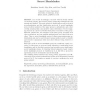291 search results - page 40 / 59 » Key Agreement Protocols and Their Security Analysis |
ACNS
2009
Springer
14 years 3 months ago
2009
Springer
Abstract. We examine the use of randomness extraction and expansion in key agreement (KA) protocols to generate uniformly random keys in the standard model. Although existing works...
CSFW
2012
IEEE
11 years 11 months ago
2012
IEEE
The onion routing network Tor is undoubtedly the most widely employed technology for anonymous web access. Although the underlying onion routing (OR) protocol appears satisfactory...
INFOCOM
2010
IEEE
13 years 7 months ago
2010
IEEE
—Generating a secret key between two parties by extracting the shared randomness in the wireless fading channel is an emerging area of research. Previous works focus mainly on si...
ACNS
2006
Springer
14 years 2 months ago
2006
Springer
In a society increasingly concerned with the steady assault on electronic privacy, the need for privacy-preserving techniques is both natural and justified. This need extends to t...
EUROCRYPT
2008
Springer
13 years 10 months ago
2008
Springer
Secure multi-party computation (MPC) is a central problem in cryptography. Unfortunately, it is well known that MPC is possible if and only if the underlying communication network...

